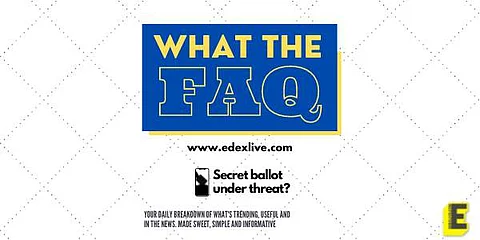

The BJP government introduced, discussed and passed the Election Laws (Amendment) Bill, 2021 in the Lok Sabha on December 20 in its now trademark blitzkrieg style of passing legislation in the Parliament. Although minimal discussion and debate happened in the house over the Bill, social media was agog with voices both for and against the measures proposed in the Bill, which was passed by the lower house.
We break down exactly what the Bill proposes to do, and what it could mean for the state of democracy and elections in the country.
What does the Bill specify?
- Fresh voters will be asked for their Aadhaar ID numbers to establish identity.
- Aadhaar's unique number can be used to "authenticate" the identity of registered voters.
- It also added three qualifying dates (originally, it was just January 1) on which new voters, who cross the age of 18 in the new year can register to vote. This was done by amending Section 14 of the Representation of the People Act, and adding April 1, July 1 and October 1 as qualifying dates.
- The bill also proposed amendments to introduce gender-inclusive terminology in the electoral process, by amending Section 20 of the RP Act. For example, the term 'spouse' will now be used in place of 'wife'.
Why was it introduced?
In March this year, Ravi Shankar Prasad, who was the Law Minister then, said that a linkage between Aadhaar card and the voter ID card was necessary to deal with the "menace" of multiple enrollments of the same person.
Will it now be compulsory to link your Aadhaar with your voter ID card?
Law Minister Kiren Rijiju, who introduced the bill in the House said that linking Aadhaar with voter ID cards will be voluntary, and not compulsory. However, the Bill's statements make it clear that if the government wants to link your Aadhaar to your voter ID to access your biometrics, or 'authenticate' identity, citizens simply cannot refuse to comply without providing 'sufficient cause'. The government gets to decide the nature and name of that sufficient cause. So although it isn't compulsory for you to take the initiative and link your Aadhaar card with the voter ID, you do not have the right to say no if the government asks for it.
Have governments before the current one suggested linking Aadhaar with voter ID?
Linking Aadhaar with voter ID was first proposed by the co-founder of Infosys, Nandan Nilekani, who also happens to be the brains behind the Aadhaar project. He had proposed linking the Aadhaar with the voter ID in 2014 to the Election Commission of India. The ECI then conducted an experimental exercise in Andhra Pradesh and Telangana in the districts of Hyderabad and Nizamabad in November 2014. Voters were verified with the help of their Aadhar cards, and reports suggested that this was done without informing the people. Around 40 lakh voters in Telangana and 25 lakh voters in AP were deleted from the list. However, just as the ECI announced that this would be made a national programme, the Supreme Court ordered this drill to be stopped in August 2015. In 2018, when the TS Assembly elections took place, it was reported that 20 lakh registered voters were unable to cast their votes. In Telangana, there was also a mock exercise to cast votes online via mobile phones. The most alarming aspect about these exercises was the claim that there was a leak of voter data after they were linked with the Aadhaar cards.
What did the opposition say in the Lok Sabha when the Bill was introduced?
The Bill was passed by a voice vote, and there was not much room for debate given ruckus in the parliament. However, members of the opposition were quoted saying that it could give voting rights to non-citizens. Congress MP Shashi Tharoor said, "Aadhaar is only proof of residence. It is not proof of citizenship. If you are in a position asking Aadhaar for voters, all you are getting is a document that reflects residence, not citizenship. You are potentially giving the vote to non-citizens."
Although the bill has not yet been introduced in the Rajya Sabha, Mallikarjun Kharge, the leader of the Opposition in the Upper House tweeted, "Modi Govt has passed the Election Laws 2021 amendment bill without any discussion or debate. The bill is in violation of SC Puttaswamy judgement, & will lead to mass disenfranchisement."
Can the linkage be misused?
Critics have been calling it the 'end of the secret ballot'. They are also saying that it will define who gets to vote. Details such as residence and phone numbers will be available with the government, giving it an opportunity to exclude voters based on racial profiling, data breaches, and the possibility of targeted campaigning.
